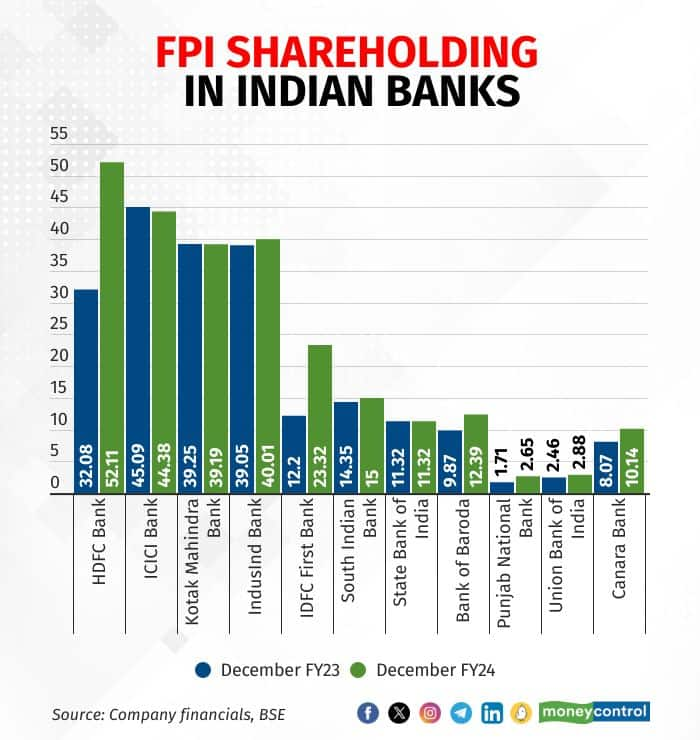Experts said the shift in the stance of the US Federal Reserve, indicating rate cuts in FY25, worked in favour of Indian equities.
Foreign portfolio investors increased their shareholding in state-owned and private Indian banks during the past year, a Moneycontrol analysis of data of the top 11 banks showed.
The FPI stake in HDFC Bank jumped to 52.11 percent in December from 32.08 percent in December 2022, the data sourced from banks' investor presentation and the stock exchanges showed. Among public sector banks (PSBs), their stake in Bank of Baroda jumped to 12.39 percent from 9.87 percent a year ago.
IDFC Bank saw a jump in FPI shareholding to 23.32 percent from 12.2 percent. FPIs increased their shareholding in Canara Bank to 10.14 percent from 8.07 percent in December 2022.
There was no change in FPI shareholding in State Bank of India, the country’s largest. Their stake in SBI was 11.32 percent in December, unchanged from a year ago.
FPI holdings in ICICI Bank and Kotak Mahindra Bank changed marginally. FPIs had a 44.38 percent stake in ICICI Bank compared with 45.09 percent in December 2022. Their stake in Kotak Mahindra Bank stood at 39.19 percent from 39.25 percent.
Why the jump?
Experts said the shift in the stance of the US Federal Reserve, indicating rate cuts in FY25, worked in favour of Indian equities.
“FPIs in India look at the risk-reward matrix and the comparative returns available in India in relation to the global trends. The current shift in stance by the US Fed, indicating gradual tapering of interest rates, has further tilted the scale in favour of Indian equities,” said Jyoti Prakash Gadia, managing director at Resurgent India.

Additionally, the banking sector in India has become more attractive recently because of the resilience it has demonstrated and its emerging growth potential, experts said. This was evident when in September 2023, Moneycontrol reported that mutual funds increased their stake in some Indian banks.
Sanjay Agarwal, senior director, BFSI, CareEdge, said the recent market consolidation helped Indian banks to grow.
“Generally, the market consolidation has worked in favour of Indian banks. PSBs have turned around due to good performance and a lot of correction,” Agarwal said.
Many Indian banks reported record profits in the past one year. Both PSBs and private lenders reported their lowest levels of gross non-performing assets (NPA) and net NPAs.
HDFC Bank, the country’s largest private lender, reported a 51 percent jump in net profit to Rs 15,976 crore in the second quarter of FY24. SBI posted a net profit of Rs 14,330 crore. ICICI Bank’s net profit for the quarter stood at Rs 10,261 crore and Bank of Baroda’s earnings were Rs 4,253 crore.
SBI’s net NPA fell to 0.64 percent from 0.8 percent a year earlier. BoB’s net NPA stood at 1.16 percent from 0.76 percent.
HDFC Bank’s net NPA stood at 0.35 percent from 0.33 percent last year. ICICI Bank’s net NPA stood at 0.43 percent from 0.61 percent.
Additionally, over the past year, the PSU Bank index has jumped 52 percent compared with an average 12 percent jump in the share prices of some major private banks, according to data. Shares of PSBs such as UCO Bank and Punjab And Sind Bank have given astonishing returns of over 223.20 percent and 178.70 percent, respectively. Bank of Maharashtra and Central Bank of India have also gained significantly, rising 140.04 percent and 122.70 percent, respectively.
While among private sector banks, shares of banks like HDFC Bank and ICICI Bank has jumped 2.35 percent and 7.09 percent respectively. The same for IDFC First Bank changed by 53.01 percent on a YoY basis.
Gadia of Resurgent India said banks have shown a consistent performance in the reduction of both GNPAs and net NPAs.
“The capital to risk weighted assets ratio (CRAR) of both private and public sector banks has improved, indicating their robustness and capacity to expand. Accordingly, FPIs are coming forward to increase their stakes in banks to avail of the current opportunities of comparatively attractive returns,” Gadia said.
Will FPIs maintain their investments?
Experts said support by the regulator will likely continue to attract FPIs to Indian banks.
“Considering the opportunities and the support by the regulator, we expect investment inflows by FPIs,” Gadia said.
Agarwal of CareEdge added: “The asset quality of banks – and especially PSBs – has been good, and this has kept the market interested in fresh flow of investments.”


No comments:
Post a Comment